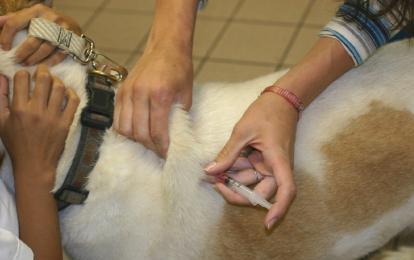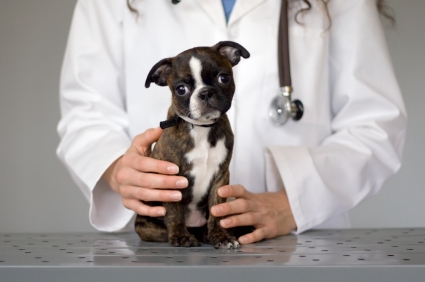|
Vaccinating Your Dog
All dogs should be vaccinated for certain serious diseases such as rabies. Not only will this help protect your 'fur-child', but it also cuts down on the spread of certain diseases--and some of these diseases can be passed to humans. Rabies The most important vaccine your dog will receive is the rabies vaccine. Rabies is a disease that is spread through bite wounds from an infected animal. It causes inflammation of the brain and is invariably fatal. The incubation period for the virus can be as long as a few months from the time of initial infection to the time the central nervous system is reached. Since many animals, such as squirrels, skunks, and raccoons, carry rabies, this is one vaccine your pup MUST have. Not only do you not want him getting this disease, most communities require proof of a rabies vaccine in order to get a dog license. Distemper Another vital vaccine for your dog is for distemper. This is a viral disease that is usually spread through infected bodily fluids but can also infect through contaminated water. Puppies from three to six months of age seem most susceptible. The disease strikes the lymph nodes and respiratory system first, appearing as a runny nose, vomiting, diarrhea, loss of appetite, and fever, progressing to twitching, convulsions, loss of motor control, and sensitivity to light and touch as the virus spreads throughout his nervous system. The progress of the disease can take several months and recovery is unlikely but not completely impossible. However, if you get your CBF vaccinated against distemper, you won't have to worry. Other vaccines that are advisable for your pup are for canine hepatitis, leptospirosis (a bacterial infection with some of the same symptoms as hepatitis which can cause liver and kidney damage), parvovirus (a viral infection that is passed through contaminated feces and is characterized by vomiting, lethargy, and diarrhea, and can be fatal), parainfluenza (an upper-respiratory disease), coronavirus (an intestinal disease similar to parvovirus), and bordatella, also known as 'kennel cough', which is a highly contagious upper-respiratory bacterial infection with symptoms similar to the common cold. A bordetella vaccine is not truly necessary unless he spends a lot of time in the company of other dogs, which increases the risk of infection (hence the term 'kennel cough'). Some veterinarians do not feel that a coronavirus vaccine is absolutely necessary either. Coronavirus is rarely fatal. Your veterinarian can advise you which vaccines are appropriate. You can administer some vaccines at home. These can be ordered through some pet-supply companies; however, you must first visit your veterinarian for a prescription.
Your Pup's First Vaccinations Dogs should get their first set of 'puppy shots' by the age of 6 to 8 weeks. If you get him from a breeder, he may already have had his first set of shots, which consist of a combination of vaccines for distemper, hepatitis, parvo, parainfluenza, and coronavirus (if your vet recommends it). Your puppy will receive his second set of shots at around 9 weeks of age, which will consist of another combination vaccine. At about 12 weeks of age, he will receive his third combination vaccine. If you live in an area where there is a known tick problem, your vet may also want to administer a Lyme disease vaccine as well. He will receive his final set of 'puppy shots' at about 16 weeks of age, at which time he will also receive a rabies vaccine. By now, you're probably asking, "Why does he need so many shots?" Here's the reason: When a puppy is nursing (especially in the first few days of life outside mom's belly), he picks up antibodies through the mother's milk that help protect him--but these don't last forever, and they actually 'get in the way' of your puppy's developing his own immunity. The 3 sets of shots will (hopefully) give his system enough of a 'challenge' to start immediately developing his own immunity as soon as his 'borrowed' immunity wears off. Blood Titers When your dog receives a vaccine, his system is 'put to the challenge' to develop a resistance to the corresponding disease. Some dogs can develop nasty reactions to certain vaccines, and it has been discovered that certain serious illnesses, such as some types of cancers, can be triggered by vaccines. So...what do you do? You want to protect him, but at the same time, you don't want him developing a serious illness down the road. Many veterinarians are now performing what is known as a 'blood titer' test. Simply put, this test measures how much immunity is 'left over' in an animal's system at the time he's due for a booster shot. If you feel your veterinarian is over-vaccinating your dog, see if he can perform blood titers. But be forewarned: for diseases like rabies, many communities may not accept titer results in lieu of a rabies certificate when it's time to renew your dog's license. Ask your veterinarian if you're interested in blood titer tests. Now that you know the importance of vaccines for your dog, please visit our page about fleas, ticks, and other parasites, and how to prevent your pup from becoming infected.
|





